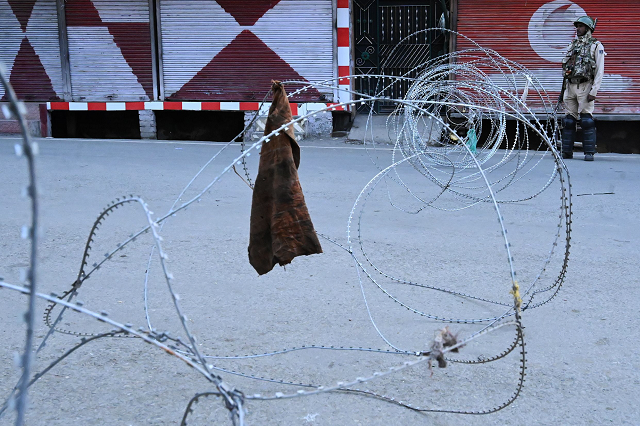Kashmir and the Fourth Geneva Convention
India must not complain about terrorism, the seeds of which it is actively sowing with its aggression

A security personnel stands guard on a street during a lockdown in Srinagar on August 12, 2019. PHOTO: AFP
There are over 700,000 Indian soldiers occupying Kashmir, making it the world’s most densely militarised zone. Life there has always resembled living in an open air prison, similar to Gaza. Article 32 of the Geneva IV prohibits torture against civilians in the occupied territory. It reads as follows, “The High Contracting Parties specifically agree that each of them is prohibited from taking any measure of such a character as to cause the physical suffering or extermination of protected persons in their hands. This prohibition applies not only to murder, torture, corporal punishments … but also to any other measures of brutality by civilian or military agents.”
According to a report by Kashmiri activists released in May this year, thousands of civilians in Kashmir have been summarily arrested and abused by Indian soldiers. The report documents 432 victims of Indian torture. Civilian deaths rose over 200% between 2013 and 2018. A New York Times story says, “Nazir Ahmad Sheikh, 61, a farmer who was featured in the report on torture, said soldiers accused him of being a militant and detained him in 1994. He said they crushed his legs with a heavy roller and then poured scalding hot water on them.”
The Indian soldiers forced him to open the lid of a coal heater with his bare hands. Nazir said, “The moment I touched it, some of my tortured and numb fingers fell to the ground.” Does that count as torture? For those who may still not fathom the gravity of this, Nazir’s following words might come in handy, “A torture chamber is like a dark well where you cry out loud and no one hears your voice.”
Article 27 of the Geneva IV states that, “Protected persons are entitled, in all circumstances, to respect for their persons, their honour, their family rights, their religious convictions and practices, and their manners and customs. They shall at all times be humanely treated, and shall be protected especially against all acts of violence or threats thereof and against insults and public curiosity.” India denied locals access to the Jamia Masjid, the main masjid in Srinagar, for Eid prayers. Is this violation of the stipulation of respecting “religious convictions and practices” not blatant enough for the global community to see?
Article 49 of the Geneva IV says, “The Occupying Power shall not deport or transfer parts of its own civilian population into the territory it occupies.” After revoking Article 370 of the Indian Constitution, India has not only stripped the Kashmiris of their autonomy, but also paved the way for Indians to buy property and make investments in Kashmir. Business tycoon, Mukesh Ambani announced that his group will invest in the region soon. I can go on about violations of the Fourth Geneva Convention by India, but the limited space allows me to pen down only so much.
India must not complain about terrorism, the seeds of which it is actively sowing with its aggression. The global community has a limited time to act. Failing to do so is the victory of Indian antagonism and the terrorism it breeds.
Published in The Express Tribune, August 15th, 2019.
Like Opinion & Editorial on Facebook, follow @ETOpEd on Twitter to receive all updates on all our daily pieces.















COMMENTS
Comments are moderated and generally will be posted if they are on-topic and not abusive.
For more information, please see our Comments FAQ